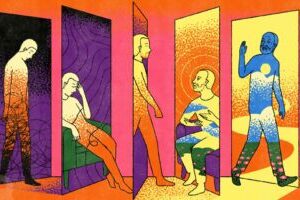From GQ: “There is a six-to-18-week waiting list for therapy on the NHS. If, then, you are deemed to need what I do – psychodynamic psychotherapy, which digs into your past to help you resolve issues in your present – you might be lucky enough to get 16 sessions, or four months’ worth. When I think about where I was after that long with Marco – still completely lost, barely scratching the surface of my denials – this strikes me as a burning injustice, a sign we are still in the dark ages of treating mental health. I do not know how we get to a place where people without the means to pay for long-term private psychotherapy are able to access it through public healthcare, only that it seems a goal we should aspire to. Once, the idea of education for everyone seemed radical – now in Britain it is a basic human right.
It is difficult to calculate, though easy to imagine, the uplift it could have on society if more people had a chance to work seriously on their mental wellbeing. ‘Reject racism, try therapy‘ read a placard at the recent anti-fascism marches across the UK, a clunky sentiment with more than a grain of truth. Someone once described therapy as a second chance at childhood; how much pain is inflicted on the world by people who are alone with the legacy of their first? Often I start to feel guilty about the fact I have benefitted from something many people, including my friends and family, do not have access to. But that also makes me more determined to stick it out.”

***
Back to Around the Web











